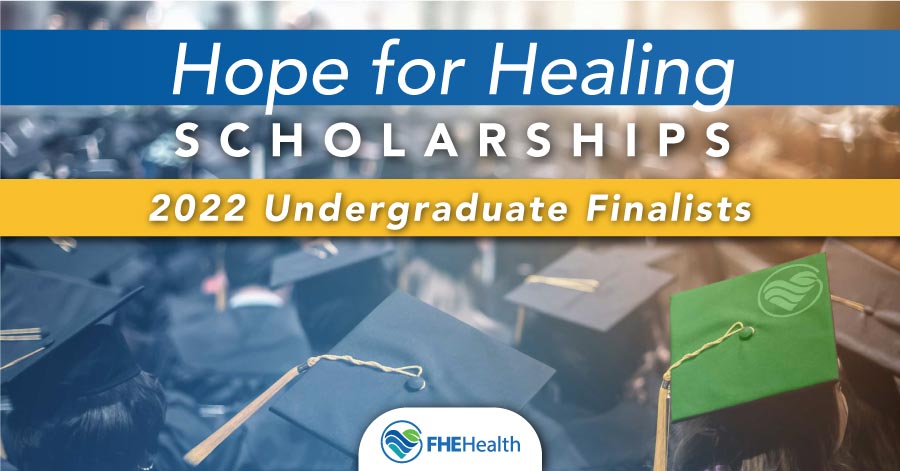
We are excited to announce this year’s five undergraduate finalists for our annual “Hope for Healing Scholarship.” The annual initiative seeks to award two exceptional students in the field of mental and behavioral health (one undergraduate and one graduate) with a $5000 grant to support their studies.
Now in its third year, the highly competitive selection process again drew hundreds of applications from around the country. Our scholarship committee then had the very difficult job of choosing 10 finalists from among the many qualified candidates who applied.
We invite you to get better acquainted with each of these five undergraduate finalists below and check back in on March 14. That is when we’ll announce who, from among these five bright, gifted people, will be the undergraduate recipient of the 2022 Hope for Healing Scholarship.
Many Different Paths to Studies in Addiction and Mental Health
Each of our five undergraduate finalists has a moving story about how they ended up in the field of addiction and mental health. Explore their many different paths here….
Anissa Mansour is a psychology major at Wellesley College. She developed an interest in mental health during her sophomore year of high school, but as she wrote in her application essay, “that passion only increased on February 14, 2018, after I lost three of my close friends in the Parkland school shooting.” After that tragedy, Mansour started a student-led Peer Support Program at her school. The organization still exists today and provides a safe space where students know they can go to find mental health support. One of Mansour’s missions is to make mental health check-ups “as commonplace as going to the doctor for our yearly physical.” After she graduates from college, she hopes to pursue a Ph.D. and continue her research in mental and behavioral health. Her goal is to become a psychology professor and positively impact the national conversation about mental illness and access to treatment.
Jack Mattingly is earning a B.A. in Psychology at the University of Arizona, having also served in the U.S. Army as a behavioral health specialist. Mattingly was born with a congenital bone disease. When he first applied for the military, he was told he’d never be accepted on account of his disability. That did not deter him. Six months later, and after a lot of hard work and physical preparation, he joined the Army and went on to make the Dean’s List in the Army’s behavioral health program. Helping other soldiers learn how to manage and cope with mental health issues inspired Mattingly to study psychology. Much like overcoming a physical disability and taking charge of his life gave him a sense of accomplishment, Mattingly wants people to know that seeking help for a mental health issue should be a source of pride.
Natalie Partipilo, an undergraduate at Portland State University and a first-generation college student, is studying psychology. She eventually wants to become a clinical psychologist. Partipilo is no stranger to childhood trauma and adversity, having experienced both since an early age. In her essay, she described “childhood memories” of “backyard birthday parties,” “confetti sheet cake,” “swimming pools,” and “sexual abuse.” Her adolescence was marked by turmoil and stress, from visits to county jails to working a full-time job to caring for her younger siblings to living with an immediate family member who suffered from severe mental illness and addiction. Partipilo fell into drug and alcohol addiction for a period in her 20s and eventually was diagnosed with complex PTSD in her 30s. Still, even in her darkest moments, “deep down within me was this desire and pull in my heart to get better, to be better,” she wrote. Today she views her past as an opportunity to help others in similar circumstances and says she is “dedicated to finding ways to break the cycle of transgenerational trauma.”
Natasha Robinson is at Southern Oregon University earning a B.S. (Bachelor of Science) in Psychology. The full-time student and single mother of two children wants to become a drug and alcohol counselor or clinical psychologist. Years ago, in the aftermath of an abusive marriage, Robinson began using painkillers and eventually sank into full-blown drug addiction. She eventually sought inpatient treatment in December 2017. That was a turning point. She went from losing her children to foster care and living homeless in her car to finding happiness in long-term recovery. Today, she has a 4.0 GPA and has been accepted into the Ronald E. McNair Post-Baccalaureate Program. She is a member of the All-Oregon Academic Team and a Ford Foundation Scholar. Robinson volunteers with many community organizations, including Sleep in Heavenly Peace, which builds beds for children in need.
Zachary Siegel is pursuing a B.A. in Psychology at the University of Kentucky. He hopes to eventually earn a doctorate in clinical psychology, with a focus on addiction counseling and suicide prevention. Siegel has grappled with these issues since an early age. When Siegel was nine, his father took his own life. He had struggled with depression and drug abuse and been in and out of the revolving door of prison. Today Siegel is working as a research assistant at STARRC labs in Lexington, Kentucky, where he is studying the effectiveness of a relatively new type of therapy, “written exposure therapy.” He also wants to serve people in prison: “I want to bring the same love I had for my father to those in prison populations,” Siegel wrote in his essay.
Want to know who will become the undergraduate recipient of the 2022 Hope for Healing Scholarship? Tune in on March 14 for our announcement.






